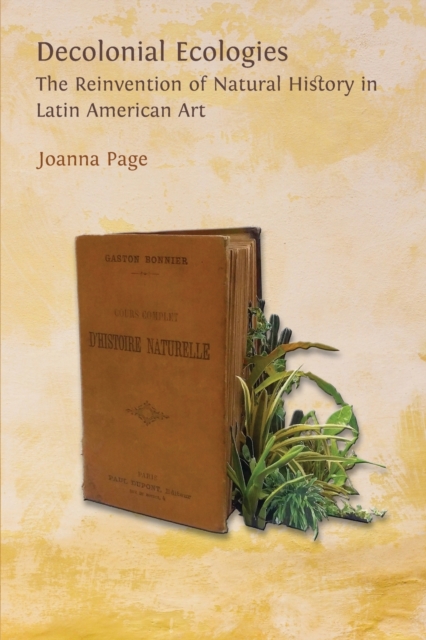Decolonial Ecologies: The Reinvention of Natural History in Latin American Art

Decolonial Ecologies: The Reinvention of Natural History in Latin American Art
In Decolonial Ecologies: The Reinvention of Natural History in Latin American Art, Joanna Page illuminates the ways in which contemporary artists in Latin America are reinventing historical methods of collecting, organizing, and displaying nature in order to develop new aesthetic and political perspectives on the past and the present.
Page brings together an entirely new corpus of artistic projects from Argentina, Brazil, Chile, Colombia, Ecuador, Mexico, and Peru that engage critically and creatively with forms as diverse as the medieval bestiary, baroque cabinets of curiosities, atlases created by European travellers to the New World, the floras and herbaria composed by eighteenth- and nineteenth-century naturalists, and the dioramas designed for natural history museums. She explores how artists develop decolonial and post-anthropocentric perspectives on the collections and expeditions that were central to the evolution of European natural history. Their works forge a critique of the rationalizing approach to nature taken by modern Western science, reconnecting it with forms of popular, indigenous and spiritual knowledge and experience that it has systematically excluded since the Enlightenment.
Drawing on photography, video, illustration, sculpture, and installation, this vividly illustrated and lucidly written book explores how these artworks might also deconstruct the apocalyptic visions of environmental change that often dominate Western thought, developing a renewed understanding of alternative ways in which humans might co-inhabit the natural world. It is valuable reading for scholars, students and anyone interested in Latin American art, transdisciplinary studies in art and science, or the environmental humanities.
PRP: 229.92 Lei
Acesta este Prețul Recomandat de Producător. Prețul de vânzare al produsului este afișat mai jos.
206.93Lei
206.93Lei
229.92 LeiLivrare in 2-4 saptamani
Descrierea produsului
In Decolonial Ecologies: The Reinvention of Natural History in Latin American Art, Joanna Page illuminates the ways in which contemporary artists in Latin America are reinventing historical methods of collecting, organizing, and displaying nature in order to develop new aesthetic and political perspectives on the past and the present.
Page brings together an entirely new corpus of artistic projects from Argentina, Brazil, Chile, Colombia, Ecuador, Mexico, and Peru that engage critically and creatively with forms as diverse as the medieval bestiary, baroque cabinets of curiosities, atlases created by European travellers to the New World, the floras and herbaria composed by eighteenth- and nineteenth-century naturalists, and the dioramas designed for natural history museums. She explores how artists develop decolonial and post-anthropocentric perspectives on the collections and expeditions that were central to the evolution of European natural history. Their works forge a critique of the rationalizing approach to nature taken by modern Western science, reconnecting it with forms of popular, indigenous and spiritual knowledge and experience that it has systematically excluded since the Enlightenment.
Drawing on photography, video, illustration, sculpture, and installation, this vividly illustrated and lucidly written book explores how these artworks might also deconstruct the apocalyptic visions of environmental change that often dominate Western thought, developing a renewed understanding of alternative ways in which humans might co-inhabit the natural world. It is valuable reading for scholars, students and anyone interested in Latin American art, transdisciplinary studies in art and science, or the environmental humanities.
Detaliile produsului









